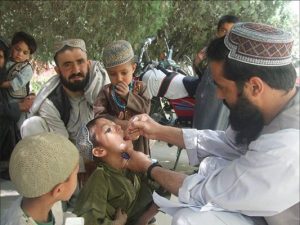Afghanistan: offensive delays polio immunization drive in Helmand
Under-fives in Nad Ali District are missing out on polio immunization due to an ongoing military operation

WHO/Afghanistan
Under-five children in Nad Ali District, Helmand Province, southern Afghanistan, are missing out on polio immunization due to an ongoing military operation against the Taliban by Afghan and NATO forces.
A three-day sub-national polio immunization campaign, targeting 2.8 million children began on 14 February in the south, southeast, west and east of the country, the Ministry of Public Health said.
Of the 500,000 children targeted for polio immunization in Helmand, about 170,000 were not accessed on 14 February – mostly in Nad Ali, Musa Qala and Sangeen districts – Tahir Pervaiz Mir, polio eradication officer for the World Health Organization (WHO) in Afghanistan, told IRIN.
“Polio immunization would not be conducted in Nad Ali and Marjah due to the ongoing conflict there,” Enayatullah Ghafari, provincial director of the health department, told IRIN.
Poliovirus is believed to be virulent in Nad Ali: Two polio cases have been confirmed there this year, according to the UN. “We are concerned about the transmission of poliovirus from Nad Ali District,” said Mir.
Health workers say they were able to reach children in Taliban-controlled areas in Helmand and elsewhere in the country during several polio immunization campaigns in 2009. Taliban leaders reportedly issued a “support letter” for each polio immunization round through the International Committee of the Red Cross.
Provincial health officials said efforts were under way to regain access to children in Musa Qala and Sangeen districts for the current immunization drive. “[The Taliban] have given us a green light and we hope to be able to immunize children in the two districts soon,” said Ghafari.
About 15,000 Afghan and foreign forces are fighting Taliban insurgents in Marjah and Nad Ali in what has been described as NATO’s biggest military operation in Afghanistan since the Taliban were ousted in late 2001.
WHO says about 84 percent of Afghanistan is polio-free but the disease remains virulent in 13 insecure districts in the south and southeast, where health workers have little or no access, and where most of the 38 polio cases in 2009 were reported. Four polio cases, three in Helmand and one in the neighbouring province of Farah, have been reported so far in 2010, according to WHO.
Courtesy IRIN, the humanitarian news and analysis service of the UN Office for the Coordination of Humanitarian Affairs.













